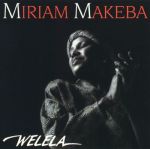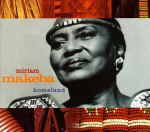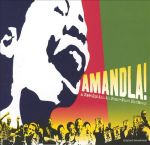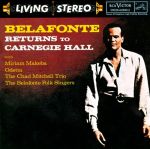Miriam Makeba, nicknamed “Mother Africa” and “The Empress of African Song,” was a South African singer and political activist. Makeba is credited with bringing the rhythmic and spiritual sounds of Africa to the West. Makeba’s social activism and music impressed American Harry Belafonte who served as her mentor and promoter in the United States. In 1968, Makeba married American civil rights activist Stokely Carmichael, which proved a detriment to her career due to Carmichael’s militant “Black Power” stance. Makeba writes about her life in Makeba: My Story which is available at the library. Here are a few songs that reflect the long and diverse career of Miriam Makeba with a mix of multicultural music, pop, blues and jazz.
A surprise Top 20 hit in the autumn of 1967, “Pata Pata” was co-written and cut by Miriam Makeba, who was then married to Afro/jazz/rock pioneer Hugh Masakela. Musically, it’s not far removed from Masakela’s groove, with a wonderful, slightly samba-esque groove driving the whole affair. Makeba wrote a similar song for Masakela titled “She Doesn’t Write” for his fabulous Emancipation of Hugh Masakela album in 1968. Underneath it all, the hook here is that the only English spoken words are essentially a dance instruction for this Johannesburg club favorite. However, unlike most “dance instruction” records, “Pata Pata” transcends the cheesy genre with a gorgeous groove, performance, and vocal. Available on the excellent Collectors Choice ’60s rarities anthology, Buried Treasure.-allmusic.com
I Still Long For You/ Miriam Makeba
Born in Johannesburg, South Africa of Zulu origin, Miriam Makeba has been affectionately and deservedly dubbed “Mama Africa” by millions of fans worldwide. This 1991 release by South Africa’s queen of song embraces several different styles of music.
“I Still Long For You” has a distinct R&B flavor, while “Don’t Break My Heart” is a sorrowful jazz ballad that features the great Dizzy Gillespie singing in duet with Makeba, and also playing a beautiful trumpet solo. Songs such as “Thulasizwe/I Shall Be Released” and “Thina Sizonqoba” evoke Makeba’s South African roots, the latter also featuring a fine performance by Nina Simone. Finally, “Vukani” spotlights the unique trumpet stylings of Makeba’s ex-husband, Hugh Masekela. More pop-oriented than some of her earlier work, EYES ON TOMORROW finds Miriam Makeba making a bold attempt to combine commercial musical genres with rootsy African music.-allmusic.com
Now back home in South Africa, Makeba hadn’t done much recording in the 1990s prior to this release, so Homeland amounts to a way of introducing herself to new audiences and updating older fans. Alas, the voice of the mighty Makeba, who was in her late sixties when this CD was recorded, frequently sounds worn and quavery (these sessions may have been an aberration, for she could still summon much of her spine-chilling power of old at the Hollywood Bowl in summer 2000). But for those who followed her turbulent career through the struggles over apartheid, it will be heartwarming to learn that she has finally found some measure of peace in her life. The English lyrics (others are sung in Zulu) sing about coming home, healing broken hearts, living for love, and children. In the album’s most touching gesture, Makeba’s granddaughter, Zenzi Lee, aimed the lyrics of the title track right at her; the dauntless freedom fighter sounds so glad to be home. As a memory refresher, you also get “Pata Pata 2000,” yet another retooled edition of her international hit from 1967, not radically different from previous versions except that Lee lends a hand with the lead vocals. The backing tracks are mostly low-key, controlled, contemporary in feeling; they don’t ignite, but they don’t get in the South African diva’s way either.-allmusic.com
Ngalala phantsi/ Miriam Makeba
Makeba’s comeback album, her first U.S. release in almost a decade, is a beautiful collection of traditional South African songs with spare production values that highlight the power of Makeba’s vocals. This is an excellent set of Xhosa folk songs she learned as a child. -allmusic.com
A sangoma is a traditional healer, one who channels the ancestral spirits who advise the living. On this impeccably produced CD, Miriam Makeba returns to her roots, singing the songs of her childhood, and in the process seeks to heal the wounds of apartheid and 30 years of exile from her South African home. The songs here are parables, lullabies, and gathering songs, deeply spiritual and moving. They are songs of struggle and perseverance delivered by Africa’s best-loved voice. Mama Africa (Makeba’s nickname) is joined by a group of soulful women singers. Some songs feature understated percussion; others are gloriously unadorned a cappella. This is an essential timeless album from one of the world’s greatest singers. –Jeff Grubb
Miriam Makeba is an icon of South African music, beyond dispute. It’s a status she’s earned over the years, and it gives her the luxury to release a smooth album like this, where she can show a great deal of her range. There are new versions of two of her most famous pieces, “Pata Pata” and “The Click Song,” updated to fit in with her new musical outlook (although it has to be admitted that the originals were much better). There are also a couple of Brazilian pieces, which wok wonderfully well for the relaxed quality of her voice, especially on “Xica da Silva,” while a French ballad, “Comme une Symphonie d’Amour,” unfortunately turns to the incredibly syrupy. She fares much better on a song like “Love Tastes Like Strawberries,” with its delicious airiness and strong lyrics, where she can really shine, and on the bluesy “Quit It,” which offers another, grittier side of her talent. A couple of the tracks come from the pen of her ex-husband, Hugh Masekela, admittedly not the strongest work on the record. She can still sing gloriously, and there are some cuts here that show that. Sadly, too much of it feels like coasting, but she’s entitled to that. Hopefully next time out she’ll challenge herself a little more.-allmusic.com
Beware Verwoerd = Naants’ indod’emnyama /Miriam Makeba
The soundtrack to Lee Hirsch’s documentary is recommended to people who enjoyed the film and anyone else who’s interested in South African freedom songs. As noted in the album’s liner notes, this is “only a snapshot of South Africa’s musical landscape.” It is mostly limited to protest music and is not as good an overall album as The Indestructible Beat of Soweto, for example. But it does feature a fine assortment of carefully chosen tracks that flow together relatively smoothly despite the differences in musical styles and recording dates (which range from “Meadowlands,” released as a single in 1955, to tracks recorded in 2000 and 2001). It offers listeners a chance to hear studio and field recordings, chants and choral pieces, spoken word snippets, prison singers, and internationally renowned artists such as Miriam Makeba, Abdullah Ibrahim, and Hugh Masekela. It also serves as a showcase with several tracks by Vusi Mahlasela, whose credentials include guest vocals on the Dave Matthews Band’s Everyday and a performance at Nelson Mandela’s inauguration as president. The songs on this album are unified by an inspiring desire for freedom that makes Amandla! more than just a musical sampler and historical overview.-allmusic.com
On May 2, 1960, Harry Belafonte returned to Carnegie Hall for what was supposed to be one of the last concerts in the venerable hall’s last season. Carnegie was scheduled to be torn down, although this was an edict that was thankfully short-lived. The hall was instead renovated and remains one of New York’s premier showplaces. The first Carnegie Hall recording from the previous year had had such an impact on the recording industry that it opened up new vistas for live recordings. Belafonte faced the challenge of living up to his own legend. For this concert, he began what would be a concert tradition for him: sharing the spotlight with up-and-coming folk performers. Representing the new collegiate folk singing group trend was the Chad Mitchell Trio, currently appearing at New York’s Blue Angel, where Belafonte had seen them perform. South African singer and activist Miriam Makeba, another Belafonte discovery, also performed, as did folk and blues singer Odetta, and the Belafonte Folk Singers. The guest stars nearly upstaged Belafonte, but this turned out to be de rigueur for his concerts. Highlights include Odetta’s powerhouse medley of the work songs “I’ve Been Driving on Bald Mountain” and “Water Boy,” the Folk Singers’ exciting “Ox Drivers Song,” Makeba and Belafonte’s charming duet on “One More Dance,” and the Mitchell Trio’s exuberant Israeli song “Vaichazkem.” For a finale, Belafonte turned to the Mexican folk dance “La Bamba,” treating it to an eight-minute-long heels-flying festive romp.-allmusic.com










 Posted by arts
Posted by arts 